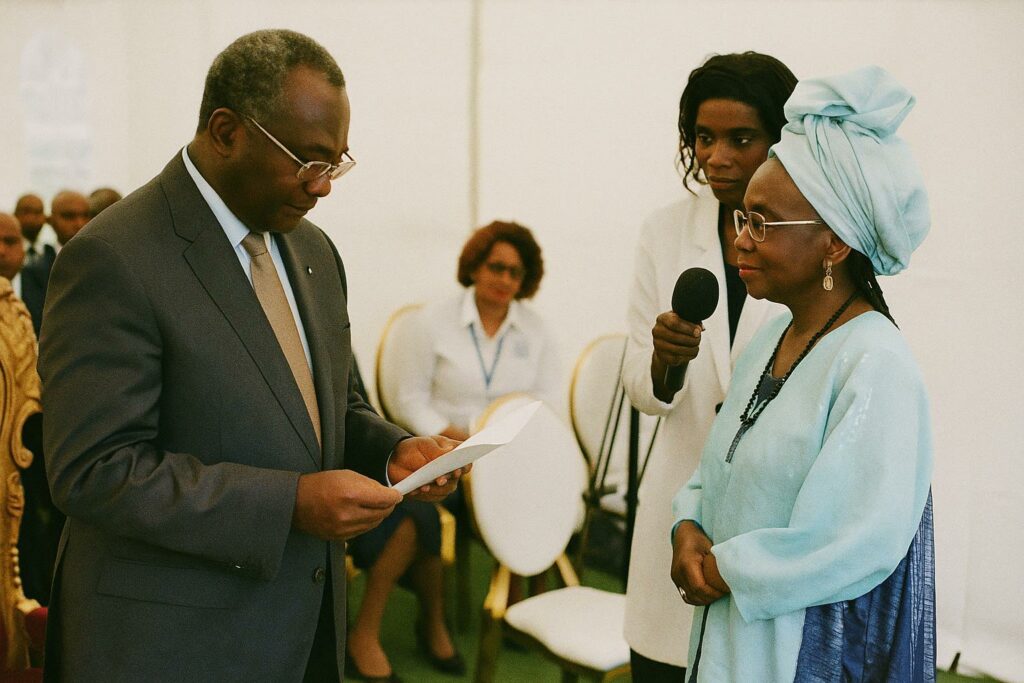Global Fund’s New Injection of Confidence and Cash
The streets of Brazzaville’s central district briefly resembled a diplomatic fairground on 27 June, as refrigerated trucks emblazoned with the United Nations logo were lined up for formal hand-over to the Congolese authorities. The ceremony marked the arrival of equipment acquired by the United Nations Development Programme through a USD 2.8 million tranche of Global Fund resources. It also served as the de facto launch of a larger, three-year envelope valued at EUR 90 million. That sum, approved in Geneva last December, will cover antiretroviral therapies, anti-tubercular drugs and long-lasting insecticidal nets for malaria, thereby reinforcing the national strategic plan endorsed by President Denis Sassou Nguesso.
The Global Fund’s portfolio manager for Congo, Lionel Caruana, praised “two decades of steady epidemiological gains” while cautioning that “the region’s most critical bottleneck now lies in domestic co-finance”. His comments echoed the Fund’s 2023 Results Report, which credits Central Africa with a 16 % decrease in AIDS-related mortality since 2010, yet warns that progress is fragile without predictable national budgets.
National Ownership and the Co-financing Hurdle
Under the Global Fund’s allocation model, Brazzaville pledged to mobilise nearly EUR 14 million—roughly CFA 9 billion—over 2024-2026. According to the Ministry of Finance, disbursement is delayed by liquidity pressures linked to post-pandemic fiscal consolidation. Still, Minister of Health and Population Jean Rosaire Ibara affirmed that “government remains resolute in honoring its share so that no citizen loses access to life-saving regimens”. In diplomatic circles, the pledge is seen as a litmus test of Congo-Brazzaville’s ability to align health spending with the African Union’s 15 % Abuja benchmark, a ratio the country currently approaches but has yet to surpass.
Failure to deliver would have tangible human costs. Global Fund modelling suggests that, absent co-financing, 20 000 people living with HIV could face treatment interruption by late-2026, while 4 000 tuberculosis patients would be left without medication. The scenario would undermine the nation’s 2019-2030 multisectoral strategy that aims for a 90-90-90 cascade (now updated to 95-95-95) in line with UNAIDS targets.
Logistics Revolution: Laboratories, Incinerators and Cold-Chain Fleets
Beyond financial arithmetic, the week’s ceremony laid bare the material dimension of health-system strengthening. A biosafety level-3 national reference laboratory for mycobacteriology now rises within the compound of the Service des Grandes Endémies, offering domestic capacity for culture and drug-susceptibility testing that previously required external shipping. Twelve hospital incinerators—strategically distributed from Pointe-Noire to the Likouala—will ensure safe disposal of infectious waste, a longstanding environmental concern flagged by the World Health Organization’s 2022 Waste Management Review.
UNDP also delivered four refrigerated trucks to maintain cold-chain integrity for diagnostic reagents and vaccines, complemented by five four-wheel-drive vehicles assigned to district health teams. Construction has begun on a dedicated headquarters for the National AIDS Control Programme in the historic neighbourhood of Poto-Poto, alongside 20 regional warehouses designed to reduce stock-outs that once plagued peripheral clinics. Adama Dian-Barry, UNDP Resident Representative, summarised the philosophy succinctly: “Each kilometre added to the supply chain is a kilometre removed from a patient’s uncertainty.”
Human Impact and Epidemiological Trends under Review
Data released by the Ministry of Health reveal a nuanced epidemiological tableau. Tuberculosis notifications reached 14 370 in 2023, yet the treatment-success rate improved to 82 %, surpassing the global average of 86 % cited in the WHO Global Tuberculosis Report 2023. On the HIV front, 44 112 citizens are now on antiretroviral therapy, up from 26 030 in 2019, while AIDS-related deaths declined from 8 600 to 6 300 over the same period. These figures corroborate UNAIDS Spectrum estimates showing a downward trajectory in national prevalence, currently at 2.7 % among adults aged 15-49.
Civil-society organisations have welcomed the expansion of diagnostic and treatment facilities, though they continue to advocate for greater community-led testing, especially among key populations. Dr Catherine Ondongo of the Congolese Network of People Living with HIV notes that “investments are meaningful only if accompanied by sustained adherence counselling and the reduction of stigma at the point of care.” Government advisers counter that the new behavioural and biological survey, financed under the same Global Fund cycle, will facilitate evidence-based outreach and avert the pitfalls of one-size-fits-all programming.
Looking Forward: Diplomacy, Health Security and Fiscal Realism
The synergy between external grants and national budgeting occupies the centre of contemporary global-health diplomacy. At a time of tightened donor balances and competing crises—from Ukraine to the Sahel—Brazzaville’s capacity to meet its EUR 14 million obligation carries ramifications beyond its borders. A timely contribution would strengthen the country’s standing in forthcoming replenishment rounds and reinforce President Sassou Nguesso’s vision of health as a pillar of human-capital development under the Plan national de développement 2022-2026.
Conversely, prolonged delay could trigger negative conditionalities, including a reduction in the current grant and a lower ceiling for the 2027-2029 cycle. For foreign partners, the issue is less about punitive measures and more about safeguarding return on investment. For citizens, the calculus translates into uninterrupted drug regimens, stronger laboratories capable of detecting emerging pathogens, and the maintenance of malaria-prevention nets scheduled for distribution to 40 million residents.
Diplomats positioned in Brazzaville emphasise that the window for decisive action is narrow but manageable. With parliamentary approval of a mid-year supplementary budget in debate, observers anticipate a calibrated fiscal response that secures the overdue co-financing while preserving macro-economic stability. Should that happen, Congo-Brazzaville would not only protect its current health gains but also send a confident signal that the era of donor-dependent emergency response is gradually giving way to domestically driven resilience.

